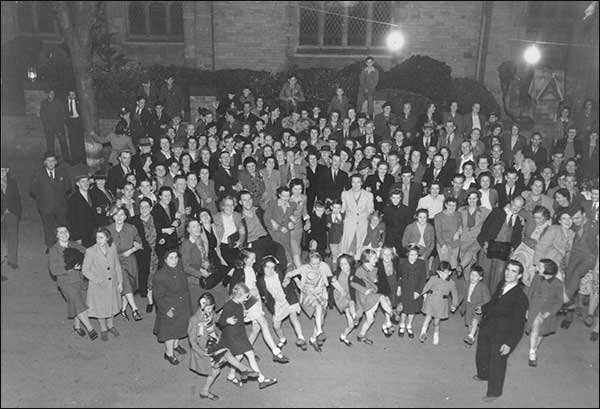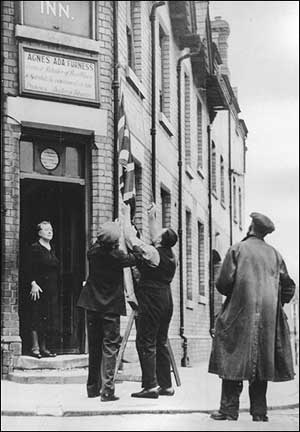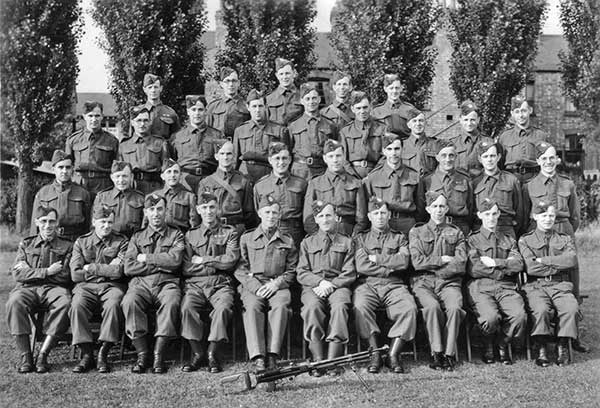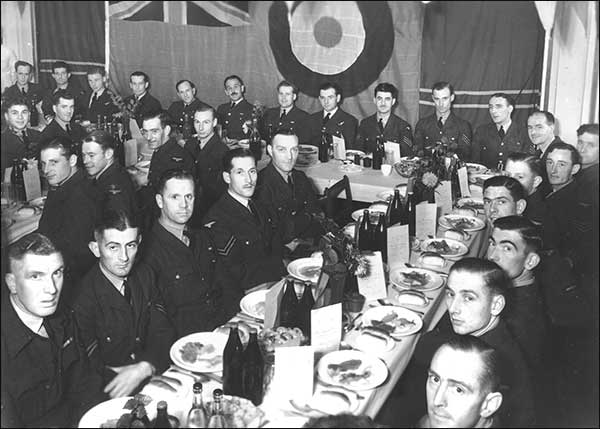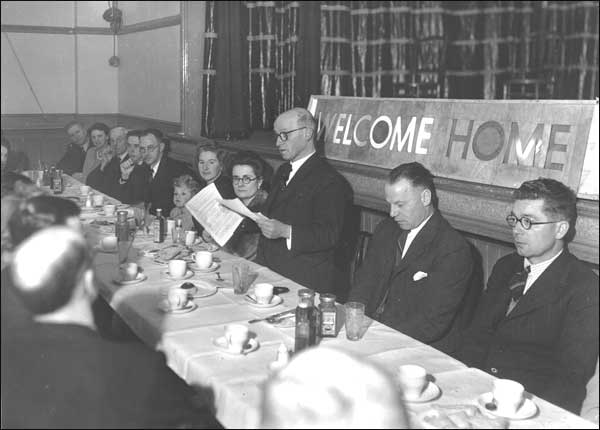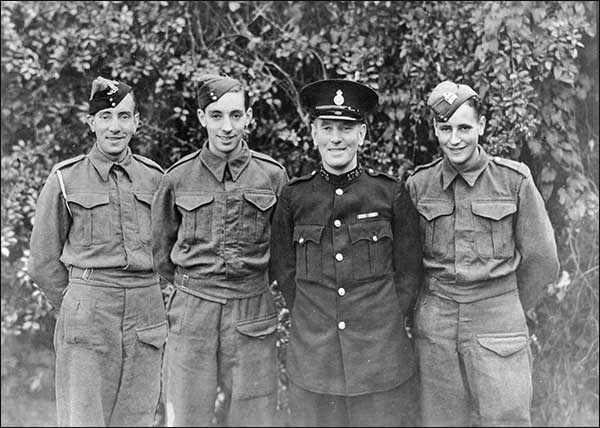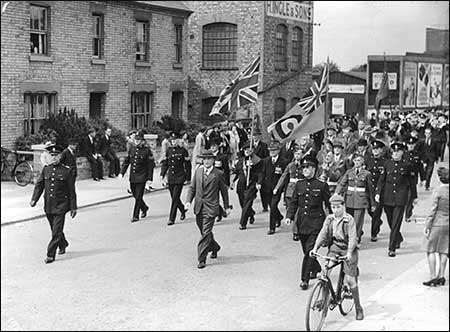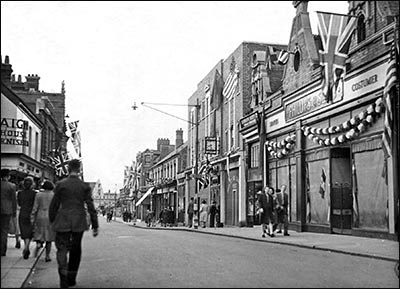The Rushden Echo and Argus, 11th May, 1945, transcribed by Gill Hollis
Joyous Days Follow Surrender of Nazis
Historic Holiday for Victory
This week stands out in history, the nightmare of German frightfulness has passed, and free people everywhere have rejoiced as never before – with a depth of feeling unique in its recognition of deliverance from evil. How Rushden and Higham Ferrers celebrated is told below.
A victory atmosphere developed rapidly at Rushden on Monday. All the factory workers were declared to be “on tenterhooks,” and in the shopping centre the tradesmen seemed principally concerned with decorating their premises and selling victory favours. By afternoon the High-street was bright with flags, streamers and window decorations, and in the evening the people of the residential streets began their preparations.
The confusing radio announcements created a curious state of uncertainty, but when, at last, Tuesday was named as VE-Day, the mood of rejoicing was soon apparent.
There was no attempt to work up demonstrations, but the prompt appearance of a souvenir “Evening Telegraph” edition, which sold out with a rush, seemed to be taken as a signal that celebrations might begin.
Young people, American soldiers and British “boys” on leave dominated High-street. Some walked arm-in-arm along the carriageway. Girls wore headbands and scarves of red, white and blue.
At first the general cry was “Do we work to-morrow?” It was soon understood, however, that the holiday had begun.
The father of three soldiers announced “I’m going to put the photos of my three kids in the window at home.”
First show of floodlighting – and a very fine one – was at the Lime-street works of Messrs. John White. Clubs were crowded and High-street was astir until eleven o’clock, but everywhere the emphasis was on “to-morrow.”
Victory Stroll
Tuesday offered early and genuine promise of fair, if humid, weather conditions. Milk vans making the early rounds carried Union Jacks, and by nine o’clock, when people began pouring into High-street, the festive touch was universal.
Half Rushden was “down Street” for an instinctive victory stroll. There were early queues for fruit (including oranges), fish and meat, but the main crowd was out for the simple joys of freedom and fellowship.
The girls had achieved wonders in red, white and blue dress schemes, and almost everybody wore a rosette or other patriotic device. Formations of Flying Fortresses roared over the town.
In the side streets people were busy completing the decorations. Some material stored since the Coronation in 1937 was put to good use, and particularly gay effects were seen in Crabb-street, Spencer-road, Griffith-street and South-terrace (where a communal tea-party figured in the day’s arrangements).
An Austrian flag was seen in Higham-road.
The early afternoon was quiet, but a matinee at the Ritz Cinema proved popular, and the audience appreciated the enterprise of the management in relaying to them Mr. Churchill’s victory announcement. Soon after the official message the bells of St. Mary’s made welcome music.
At four o’clock came civic recognition of the occasion, and thousands of people gathered as near to the Council Buildings as they could. The crowd stretched well into Rectory-road and down to the Parish Church wall. A few dozen soldiers among them, were perched high on the roof of the United Counties garage.
The ceremony was brief and simple, consisting only of a speech by the Council Chairman (Mr. H. Waring J.P.,) and the singing of the National Anthem, led by the combined Temperance and Town bands, who occupied the yard of the ‘bus station.
Speaking from a platform at the entrance to the Council Buildings, Mr. Waring opened with a reminder that, unlike the Armistice Day of 1918, this occasion was not the end of the world war.
“Even if that happy climax had been reached,” said Mr. Waring, “there would still be those for whom war has sad and even bitter memories of loved ones whose lives were given to save our lives; of other loved ones whose maimed bodies kept us uninjured. There may be the blinded, through whose total darkness we have the light of vision. In quiet and considerate manner, as we go through to-day, let us give a thought for them all.”
After a reference to those who must fight “an enemy as terrible and as evil as the Germans,” Mr. Waring said they thanked God that as a nation they had been spared once more from unspeakable evil, though at the beginning of the war this looked impossible.
Advice to Young
He hoped the day would live long in the memories of the young, because that was the one thing necessary – a long memory.
“You young people,” he continued, “will often be told that your lives and your manner of living will depend very largely on your own actions. You will be told that you must take a much more active part in the affairs of the country than did the people of my generation.
“No-one wants war, yet wars, even more terrifying, will come unless the ordinary people learn why they come. We in our generation were too short-sighted: I hope you will have world-wide vision. You know what is happening in your school, in your street; what is happening to your friends who live quite near. Get to know what is happening to boys and girls who are like yourselves except that they do not speak our language or may have a different coloured skin; children who live in continents the world over, but whose lives will inter-lock with yours at some point, and with increasing importance as the world recovers from war.
“If we get to know what is going on in the world, then the world may be kept sane. To-day we know we have been given another opportunity to rebuild. The work of rebuilding will be mainly yours. I pray that you may have wisdom, well-informed minds, and a high purpose of heart to carry out that task.”
The Council members supporting the Chairman were Mr. J. George (Vice-Chairman), Mrs. O. A. H. Muxlow, Messrs. J. Roe, W. E. Capon, F. Green, J. Allen, T. W. Cox, J. T. Richardson, A. F. Weale, W. J. Sawford, J. E. Dilks, J. H. J. Paragreen, E. A. Sugars, T. J. Swindall and A. H. Bailey, with the Clerk (Mr. T. L. Watts), the Chief Financial Officer (Mr. B. W. Williams) and the Librarian (Miss M. Perkins).
Homely Joys
Twenty neighbours of Manton-road had a sumptuous victory tea. Tables were decorated with the flags of the Allied Nations and the yard was bright with bunting. Knuston Spinney residents also held a party.
In the evening, thanks to the Salvation Army Band, one might hear for half an hour at the “Rose and Crown” corner anything from a hymn tune to “Simon the Cellarer.”
By 7.30 St. Mary’s Church had filled to overflowing for a thanksgiving service attended by the Council, and at the same hour congregations larger than those usually found on a Sunday began to express their gratitude at the other churches. Collections were devoted to Red Cross, Church Reconstruction and similar funds.
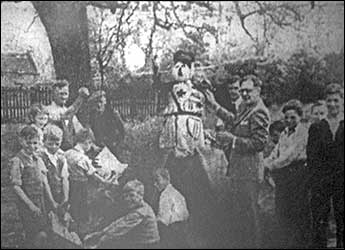 |
|
Preparing Hitler for a flaming finale near Rushden Hall
|
At the Hall Grounds, now in full mantle of Spring, people of all ages up to about 70 found welcome outlet for their spirits in the joy of old-style dancing on the circular course around the bandstand, where the tunes were played by the Temperance and Town Bands. There was also a large crowd to watch the dancing, the park having been a popular haven throughout the day.
Before dark the first bonfires were alight. One was found on high ground near the Hall and made a grand blaze in which was consumed the extravagant effigy of the late Mr. Hitler - tough to the last, as spectators observed.
In the usually sedate Griffith-street a highly combustible replica of the same gentleman hung mutely until 10.30, when final justice was administered and body crashed in flames to billow out clouds of smoke and wake the echoes with sporadic explosions. A sum of £3 13s for the Red Cross was collected from a delighted crowd.
Other bonfires were noticed in Orchard-place and at the North end of High-street.
Night Scenes
From dusk until well past midnight the main street swarmed with people along its entire length. Between the facing shafts formed by the flood-lighting of St. Mary’s and the War Memorial, crowds lingered for hours. The bells, which had been chiming intermittently since mid-afternoon, had a dominating influence, and most people wanted to see the ringers.
Flocking to the West door, they found the ropes handles by six boys – members of St. Mary’s Scout Troop who volunteered for campanology about nine months ago. These boys, whose hours of enthusiastic labour won praise and gratitude from thousands of townspeople, were Harvey Meadows (treble), John Bayes, Alan Knott, John Mepham, Jim Bugby (captain) and Frank Murdin (tenor).
There was a remarkable scene after 11 o’clock, when someone pushed open the North door of the church and fumbled a way into the dark aisles. Lights were switched on, and hundreds of men and women, some with children in their charge, poured into the church, the majority going into pews for spontaneous private prayer. This continued until midnight.
Floodlit flags high over the Ritz Cinema, the brilliant John White factory off Higham-road, high-powered lights outside the Palace Cinema, and lighting effects on several business premises, notably at Spencer Park Garage, brightened the way of the perpetual crowds. Towards mid-night the young folk were roving in singing formations, stopping frequently for a dance, and at one o’clock the sound of singing was still heard by those who had gone to bed.
A jolly crowd of dancers filled the Windmill Hall in the evening. The hall was specially decorated and the Lido Players and Annies’ Band played for old and new dances. The proceeds will go to the Club’s Service Men’s and Benevolent Funds.
Wednesday was also a holiday, and celebrations continued on a much quieter scale.
|
